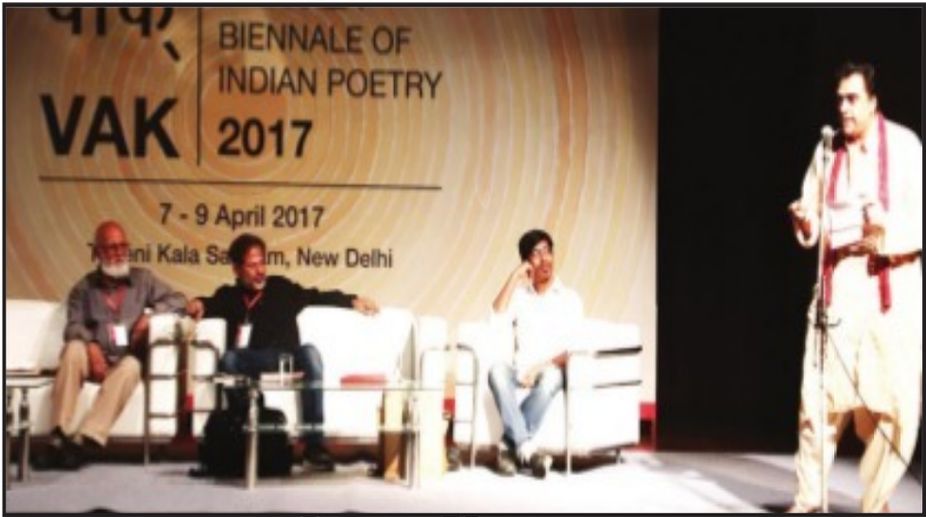When is Tulsidas Jayanti; why is it celebrated?
Tulsidas Jayanti is marked to celebrate the birth anniversary of Goswami Tulsidas, a Hindu saint, and an outstanding poet. Tulsidas is distinguished for great devotion towards Lord Ram.

Biennale of Indian poetry 2017 (PHOTO: SNS)
Poetry is a discipline over which a poet's morality, cognitive and civilised selves exert little control and thus making the poem, innate and true. A poet's conscience is not a prescribed societal conscience. Nobody can become a good poet without surrendering to its form. The best poetry involves selfconfrontation. Exploring the different hues of Indian poetry, its history, relevance and importance, Vak, a festival organised at the Triveni Kala Sangam, talked and discussed the plethora of hidden meanings and importance of Indian poetry.
Thiyam, one of India's most influential and important theatre practitioners, brought his unique stage presence by the reading of Ground without Surface. The poem, which reflects the predominance of Manipur as the physical and aesthetic foundation in his work, speaks to both "restive earth and bewildered soul".
Advertisement
"It seems the moon's leaking like my thoughts… On a starless night… Don't know how long I shall live pretending I'm wise. Today, before God truly… History and time, I want to sacrifice both so that I can earn even if only a little virtue. The ear hears many moaning voices… It's been long since the ground has been missing beneath my feet," he read.
Advertisement
Citing the relevance of poetry and its role in establishing the freedom of speech in the country, Malayalam poet K Satchidanandan said , "Poets have the right to disturb and agitate by challenging the status quo. The freedom to disturb and agitate is one of the most important rights a poet has, especially in the history we find ourselves living in today. Poetry is the freedom to conceive, to create alternative worlds, different ways of seeing, going beyond reality to escape it. Or perhaps even oppose the real and inhabit other realities. Poets need the freedom to relate to the world on their own terms, to respond to world events, situations and contexts in their own ways and to use language as they see fit". Satchidandan is one of the 45 participating poets at the discussion.
Describing disciplines like poetry, music and the arts, Ashis Nandy , a celebrated socio-cultural analyst said,"A poet's conscience is not a prescribed societal conscience. Nobody can become a good poet without surrendering to its form. The best poetry involves self-confrontation. It is not only an expression of the self, but a method to deal with the anti-self within. "In writing poetry, the poet's morality does not matter very much. The greatpoet will automatically inject primitive ethical considerations into his or her poetry. A subversive element in itself, poetry can't be socialised or silenced. Its values are acquired biologically".
The biennale of Indian poetry, organised at the Triveni Kala Sangam, began with the recitation of poems in Odia, Tamil, Assamese, Manipuri and Kashmiri. Renowned poets like Haraprasad Das (Odia), Nilim Kumar (Assamese), Salma (Tamil), Ratan Thiyam (Manipuri) and Majrooh Rashid (Kashmiri) set the tone and mood at the festival with their recitation. Prior to the readings, noted Hindustani classical singer Bhuvanesh Komkali vocalised a set of Bhaktisonnets and compositions .The threeday celebration of verse witnessed 40 invited poets, who read their works spread across 15 languages over more than 10 sesssions.
"It is hoped that the Biennale will bring forth the vibrant and furious creativity; the dynamic imagination; the plurality of visions, styles and idioms; the surprising resonances and disturbing memories; the darings and aesthetic risks; the merging of time with the timeless; the immediacy and urgency; the socio-cultural and political reach of contemporary poetry of India in its full range and complexity," said eminent Hindi poet Ashok Vajpeyi.
Advertisement